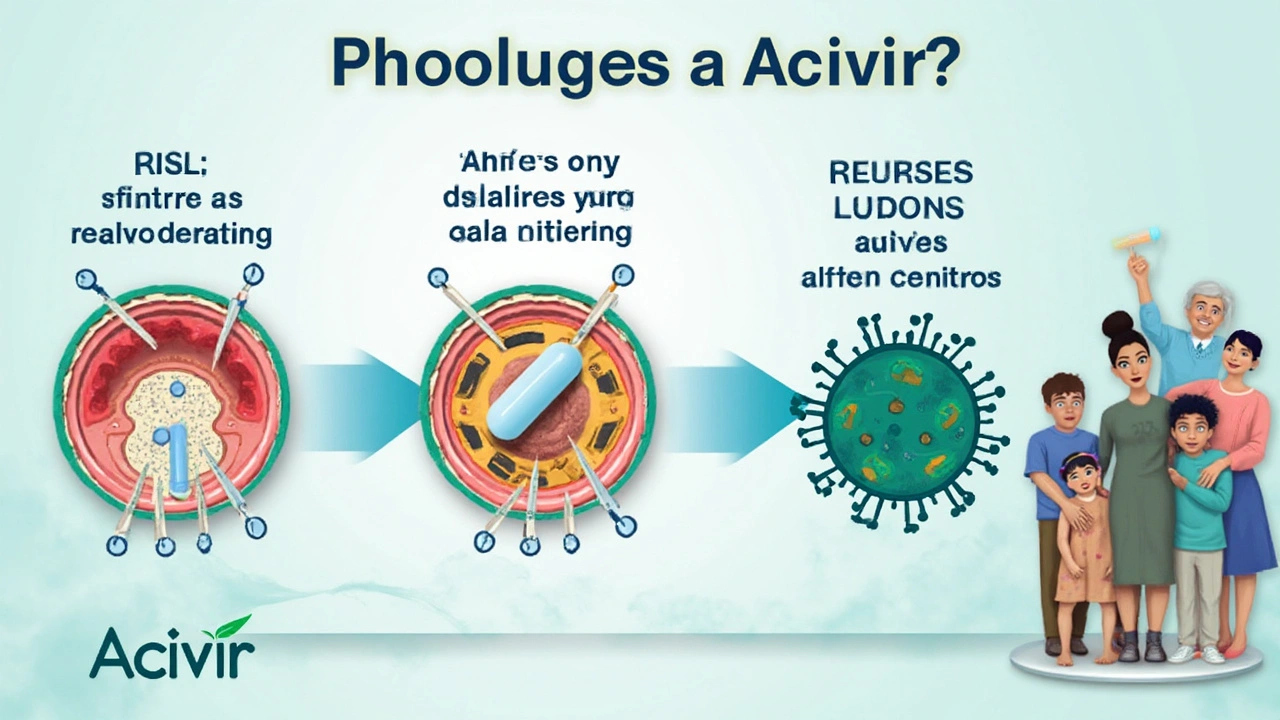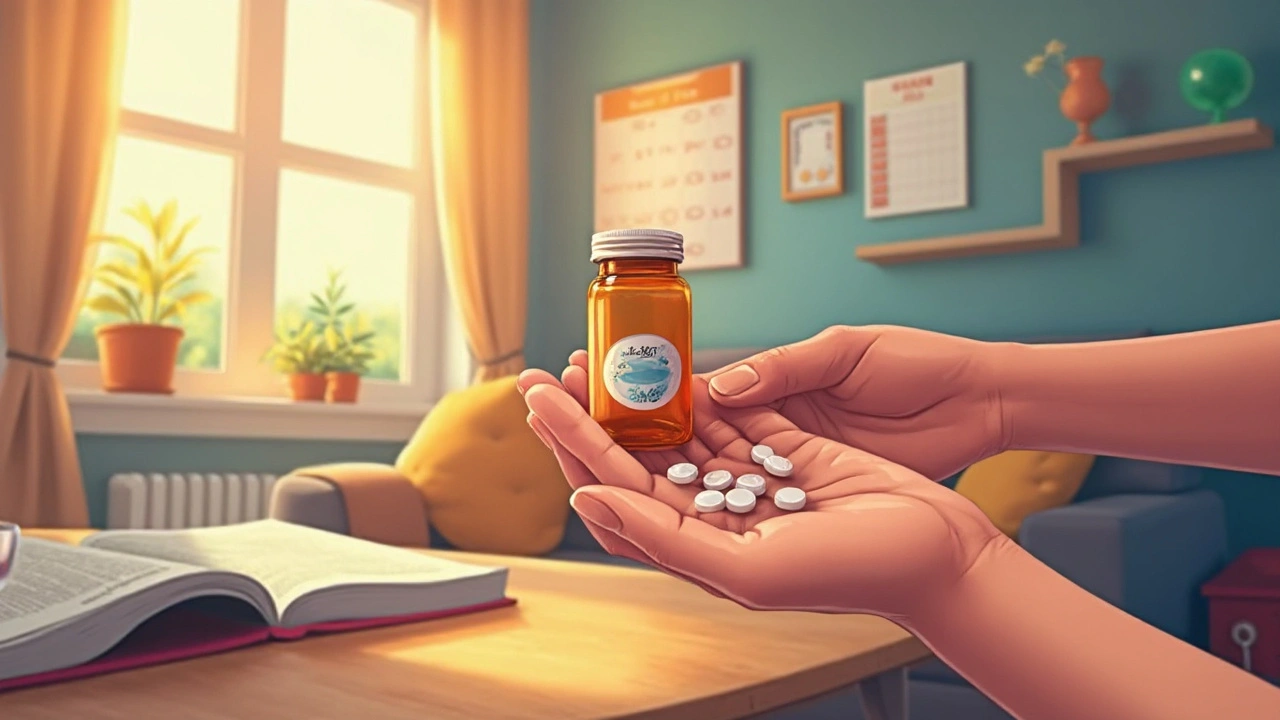If you ever had a cold sore pop up right before a big event, you know the panic that comes with those tiny, burning blisters. My son Rowan once woke up with a lip like he'd lost a boxing match—embarrassing for an eight-year-old, and honestly, for a dad too. The doctor handed us a box of Acivir pills with the blandest instructions ever. Later, I realized there’s way more to using these little tablets than anyone tells you upfront. Countless people grab Acivir pills every year without understanding what’s inside those tiny capsules, how they work, or what to expect after you swallow one. This article will break down everything you wish someone had told you about Acivir the first time around.
What Are Acivir Pills and How Do They Work?
Acivir pills are a brand name for acyclovir tablets. These are prescription antiviral meds—the kind doctors usually offer when you’re dealing with herpes viruses. That covers cold sores (herpes simplex type 1), genital herpes (type 2), and chickenpox or shingles (varicella-zoster). Ever wondered why you can’t just take any antibiotic for cold sores or shingles? Viruses and bacteria are not in the same league. Bacteria have cell walls and other tiny parts antibiotics can target. Viruses are much simpler; they hijack your cells to make more copies of themselves, kind of like a computer virus takes over your laptop. Acyclovir blocks the virus’s ability to copy its DNA, which keeps it from spreading in your body.
The tablets usually come in strengths like 200mg, 400mg, or 800mg. Doctors pick the dose based on your age, weight, and how bad your infection is. Here’s a cool fact: acyclovir was one of the first drugs proven to clamp down on a DNA virus in trials back in the 1970s. Before this, people just suffered through outbreaks. Acivir doesn’t wipe the virus out completely—it hangs out silently in your body, like a bad tenant refusing to leave. What Acivir does is slam the brakes on new outbreaks, make the symptoms milder, and shorten how long you feel like hiding from the world.
One thing people miss: timing really matters. The earlier you pop your first pill (usually within 1-2 days of symptoms), the better it works. Wait too long—say, you decide to tough it out for a week—and Acivir won’t be anywhere near as effective. Many doctors recommend it for five to ten days per outbreak. If you get lots of cold sores or are often sick with shingles, they may suggest taking it every day as a low dose. This is called suppressive therapy, and it’s a game changer for people who can never predict when the next outbreak will ambush them.
There’s more: Acivir pills can be life-saving for folks with weaker immune systems. Think newborns, people on chemotherapy, or anyone with HIV. Viral infections can get out of control quickly in these cases. Acivir helps keep things in check. If you’re healthy, odds are your outbreaks will be more annoying than dangerous, but chronic discomfort is reason enough to ask your doctor about Acivir—and whether you’re taking it at the right time and for the right length.
Just a quick heads up—Acivir isn’t a magic bullet. You won’t suddenly be immune from future outbreaks. The herpes viruses are craftier than that. Also, the pills do nothing to help with the itch or pain instantly. They dial down the virus, but you’ll still want lip balm, ice, or other “home remedies” to ease the symptoms in real-time.

Correct Ways to Use Acivir Pills Safely: Dosage, Side Effects, and Smart Tips
So, let’s say you or your kid gets handed a prescription, and the pharmacist warns you to “finish the whole course.” What does a normal Acivir dosage look like? For adults, the usual cold sore or genital herpes dose is 200mg five times a day, roughly every four hours while awake. Shingles may call for 800mg three to five times daily. For kids, the math depends on body weight—double-check with your doc, always. Swallow the pill with a big glass of water. Why water? Acyclovir can sometimes be hard on your kidneys if you’re not well hydrated; chugging fluids helps your body flush it out safely.
Missing a dose is pretty common, especially when you’re running around after kids or swamped at work. Don’t panic—just take it as soon as you remember unless it’s almost time for the next dose. Then skip the missed one. Never double up; that won’t make the sores heal faster, and it could make side effects worse.
Speaking of side effects, Acivir is safer than most people think, especially if you take it for just a week or so. Mild headaches, upset stomach, feeling tired, or having the runs—those are the common ones. My kid Rowan complained more about the taste than any side effects (he says they taste like chewing chalk). Rarely, it can cause confusion, hallucinations, or kidney troubles—so don’t mess around if you feel super out of it or have trouble peeing. Call your doctor if anything feels off, especially if you’re taking other meds or have kidney issues already.
There are a few pro tips I wish someone had shared with me sooner. First, keep your pills in a dry place away from sunlight. Heat and moisture can wreck the medication’s strength. Don’t crush them unless your doctor says it’s okay—tastes nasty and could mess up the release in your system. And keep a log of when outbreaks hit. This way you can notice if anything—you ate, stress, sun exposure—triggers your symptoms. You might even catch outbreaks earlier, get the pill in sooner, and recover quicker.
If you’re taking daily low-dose Acivir (suppressive therapy), check with your doctor about kidney function tests, especially if you’re on it long term. And if you’re pregnant, breastfeeding, or thinking about it, get medical advice specific to you. Clinical studies show acyclovir is usually safe in pregnancy but isn’t “absolutely guaranteed” risk-free, so it’s something to discuss in person.
A quick note about spreading the infection—Acivir makes it less likely you’ll give the virus to someone else, but it’s never a sure thing. For cold sores, avoid sharing water bottles, chapstick, or towels. For genital herpes, using condoms and talking honestly with your partner still matters, even if you’re on the meds. Acyclovir drops virus shedding but doesn’t erase it.

Living With Herpes Viruses: Lifestyle, Real-World Challenges, and When To Seek Help
The emotional stuff is just as real as the physical symptoms. Nobody likes to talk about herpes, but almost 70% of people are infected with at least one type of herpes simplex virus. Kids pick up cold sores at school or from relatives, and adults can catch them even without obvious symptoms. Shingles hits older adults mostly, but younger people can get it too, especially after chickenpox. Even though Acivir pills make living with these viruses manageable, the stigma isn’t going away overnight. That was hard for Rowan after his first cold sore at school—kids can be cruel, and even some adults flinch if you mention the word ‘herpes.’
Managing outbreaks in real life takes more than a box of pills. Stress, sunburn, fever, changes in hormone levels—any of these can set off new flare-ups. Diet might not have a direct impact, but tracking what’s happening when outbreaks hit helps you zero in on potential patterns. Rowan learned to carry lip balm with sunscreen, and we started making sure he wore hats at soccer practice.
If you get a lot of outbreaks, it can feel unfair and isolating. Don’t hesitate to reach out to support groups—online forums or local health centers. You are not alone. Some people even journal their outbreaks, which helps spot triggers and see progress over time. And if your symptoms keep coming back, don’t be shy about asking if higher-dose or daily Acivir therapy is right for you.
Kids and teens deserve special attention. They can get embarrassed, not want to take medicines in front of friends, or get bullied for having cold sores. Normalize it with them. I told Rowan, "Even sports stars and singers get cold sores—just bad luck with a virus, not a sign you’re doing anything wrong.” The younger they learn to ask for help, the easier it’ll be as they grow up.
Watch out for red flags: if you notice your sores not healing after 10 days on Acivir, if you get eye symptoms (red, painful eyes—possible herpes keratitis), or if you experience severe head or neck pain or confusion, get help fast. And immune-compromised folks (if you’re on chemo, have HIV, or are very elderly) should check in with their doctor sooner rather than later. Acivir usually does the trick, but sometimes, the infection can get nasty and need different treatment.
Finally, a tip from our house: keep some Acivir in your travel bag if you get frequent outbreaks (with your doctor’s blessing). Airport stress and new environments can trigger cold sores or shingles, and pharmacies abroad might not have what you need. There’s no shame in being prepared. And who knows—you might just become the hero parent whose kid never misses a birthday photo after a sore pops up. Real hero moves don’t always show up in capes—sometimes, they’re quietly stashed in the medicine cabinet.


akash chaudhary
July 18, 2025 AT 17:06Alright, let's cut to the chase because misinformation about meds like Acivir is way too common. First off, it's crucial to get the dosage exactly right—like, no winging it or guessing. The instructions are there for a solid reason. People need to understand that side effects, while rare, can be serious, and ignoring them or brushing them off as nothing is just stupid. Honestly, if you're not taking it seriously or if you don't follow the medical advice to the letter, you might as well not take the pill at all. Also, proper usage isn't just about popping a pill; timing and adherence can make or break effectiveness. So, yeah, do your homework and don’t just rely on random internet posts.
Mandy Mehalko
July 17, 2025 AT 23:53Oh my gosh, I totally agree with the importance of understanding the medication properly! I took Acivir a while back, and honestly, it wasn’t that scary once I got the hang of it. The side effects were mild for me, but I made sure to talk with my doctor regularly and kept a little checklist to stay on top of my dosage timings. It helped a lot, and I felt way more in control of the whole process. For anyone struggling, don’t hesitate to reach out to professionals or even support groups. Sometimes just sharing your experience helps you feel less alone with all this stuff.
Rin Jan
July 19, 2025 AT 04:46You know what really gets me about posts like this? It’s the way people sometimes underestimate how serious taking a medication like Acivir can be. I mean, yes, it’s just a pill on the surface, but get real — it changes your body’s processes in a way you can’t just brush off. I feel like some folks approach it like popping a vitamin, but while vitamins might be harmless, messing with antivirals without full awareness is a totally different game. And don’t even get me started on the social responsibility side of things — if you don’t use these meds properly, you’re contributing to bigger health problems. So yeah, I hope more people start seeing these pills with the seriousness they deserve.
Bryan Kopp
July 19, 2025 AT 08:40From my experience, Acivir has been kind of a game-changer, but I admit I approached it with some skepticism at first. I’m usually reserved about medications and tend to do a lot of background reading before committing to anything. It’s important to look at the broader context as well — like, what other health factors might influence how you react to the pill and the possible side effects. I don’t talk much about it with others, but I believe informed usage is key. No medication is a magic bullet, but if you can fit it into your health routine cautiously, it seems to bring solid benefits.
Tim Giles
July 19, 2025 AT 17:16I have read extensively on the pharmacodynamics of drugs similar to Acivir and from a scientific perspective, the mechanism of action is quite fascinating. The pill essentially inhibits viral replication by targeting specific enzymes vital for the virus's lifecycle. However, what is equally important is adherence to the prescribed regimen to prevent the possibility of resistance development, which is a non-trivial concern in antiviral therapies. Moreover, it is advisable to monitor for any adverse effects systematically, preferably under clinical supervision. I would strongly recommend consulting peer-reviewed studies and healthcare professionals when considering its use.
Gerard Parker
July 20, 2025 AT 07:26Just a heads-up to those diving into Acivir use — make sure you cross-check drug interactions if you’re on other meds. I’ve seen cases where people missed that small detail and ended up with complications that could have been avoided. It’s not just about taking the pill; it’s about integrating it safely into your existing health plan, which might include anything from other prescriptions to herbal supplements. I’m always pushing for open communication with healthcare providers because self-medicating or assuming you know it all is a recipe for disaster. So, don’t skip the bigger picture.
Adele Joablife
July 20, 2025 AT 19:23Honestly, while everything mentioned here is valid, I can’t help but notice some of the comments come off a bit harsh, like they're trying to scare people rather than empower them with knowledge. Medication can be daunting, sure, but it’s also about confidence and understanding your body’s needs. Being overly judgmental doesn’t help anyone; it just adds anxiety. I think sharing stories about how it felt, what really happened day-to-day, could make it feel more relatable rather than a clinical lecture. Real-world tips, like keeping a daily journal or setting alarms, might actually help readers more than just warnings.
kenneth strachan
July 21, 2025 AT 09:00Okay, here’s a different take. While some preach about following the rules perfectly, life isn’t always that neat, right? Sometimes, people need flexibility, and guess what — not everyone reacts the same way to meds like Acivir. A one-size-fits-all approach is the biggest myth in medicine. Also, sugarcoating side effects or usage tips might give a false sense of security that leads to careless behavior later. It’s better to be real and a bit gritty when discussing these things. Reality is messy, and our health choices reflect that.
Heather Jackson
July 21, 2025 AT 20:23From a Canadian perspective, I've noticed that Acivir availability and guidelines can differ a bit compared to the US or India, which sometimes complicates how people understand and use this medication. It’s really crucial to be aware of your local healthcare protocols because what’s recommended or common practice elsewhere may not apply here. My advice for anyone using Acivir or any antiviral is to get as much information as you can from your local health authorities and pharmacists. They’ve got the most relevant advice tailored for your situation. Plus, don't hesitate to speak up if something about your treatment feels off or confusing!
Michelle Abbott
July 22, 2025 AT 18:53Jumping in here—not sure why there’s so much drama over some antiviral pills. Like, read the leaflet, check your symptoms, and if you feel weird, see a doctor. Problem solved. People complicate things way too much, acting like taking meds is rocket science. Honestly, unless you’re clinically illiterate or hypochondriac, this isn’t that complex. So maybe chill a bit, keep it simple, and stop all the overanalyzing? Just my two cents.
Peter Jones
July 23, 2025 AT 09:03I think a balanced approach is the way to go with Acivir. It requires respect for medical instructions, but also personal responsibility and awareness. No medication is without risks, but demonizing or glorifying it doesn’t help. Instead, sharing practical experiences, being honest about side effects, and maintaining good communication with healthcare providers creates the best environment for these meds to be effective. Not everyone will react the same way, so personal vigilance combined with professional guidance is key.